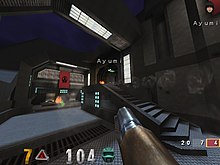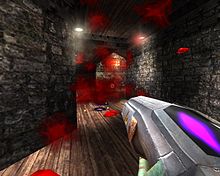| [REDACTED] | |
 Screenshot from version 0.8.8 (2012) Screenshot from version 0.8.8 (2012) | |
| Developer(s) | Free software community |
|---|---|
| Initial release | 2005; 20 years ago (2005) |
| Stable release | 0.8.8 / February 2012; 12 years ago (2012-02) |
| Repository | |
| Written in | C with the ioquake3 game engine |
| Engine |
|
| Platform | |
| Type | Single-player, multiplayer First-person shooter |
| License | GPL-2.0-or-later |
| Website | openarena |
OpenArena is a free and open-source video game. It is a first-person shooter, and a clone of Quake III Arena.
Development
The OpenArena project was established on August 19, 2005, one day after the id Tech 3 source code released under GNU GPL-2.0-or-later license.
OpenArena was officially released for Microsoft Windows, Linux, and macOS. Third parties have also ported the game to FreeBSD, OpenBSD, Android and iOS. The game was also unofficially ported to the Raspberry Pi.
Gameplay

OpenArena's gameplay mirrors that of Quake III Arena with some quality of life improvements, such as awarding a character points for pushing another character to their death. The game can be played online (against other human players) or offline (against computer-controlled characters known as bots). "Singleplayer" mode allows players to play a predefined series of deathmatches, unlocking a new "tier" of four maps after completing the previous one, or to create custom matches in any game type through the "skirmish" mode.
Game modes
OpenArena has the following gamemodes:
- Free For All: classic Deathmatch where players are all pitted against each other and the player who has the highest score at the end of the match wins.
- Team Deathmatch: a team-based variation of Free For All, with two teams of players being pitted against the other.
- Tournament: The game chooses two players in the server and makes them duel, in a classic "winner stays, loser gets out" setting.
- Capture the Flag: team-based mode where each team spawns in a base which contains a flag. They must capture the enemy team's flag while keeping their own flag from being captured.
- One Flag CTF: a variation of Capture The Flag where a white flag spawns in the middle of the map and the teams must bring it to the enemy base.
- Harvester: Each team spawns with a Skull Receptacle with a Skull Generator that spawns in the middle of the map. By fragging enemies, skulls appear in this generator. The players must collect skulls of enemy players bring them to the enemy base in order to score.
- Overload: Each team has a crystal in their base. The players of each team must travel to the enemy base and destroy this crystal in order to win.
- Elimination: a team based mode where both players must frag all of their enemies in a "Last Man Standing" style match. The team with the highest number of points wins.
- CTF Elimination: a mix of Capture The Flag and Elimination. Teams score by fragging all enemy players or capturing flags.
- Last Man Standing: a non-team variation of Elimination where all of the players start with a finite number of lives and frag each other until only one of them remains.
- Double Domination: a team-based mode which features two control points, and the players must hold them in order to score points.
- Domination: a team-based mode that has control points scattered throughout the map; the players must secure these points in order to gain points for their teams.
Reception and impact
The game is one of the most popular open-source first-person shooters, particularly among fans of the original Quake III Arena. However, some others has criticized it as incomplete, saying that this detracts from long term play. The game has been praised for its portability and ability to run on old hardware, as well as creative bot design. OpenArena has been used as a platform for scholarly work in computer science. Some examples include streaming graphics from a central server, and visualizing large amounts of network data.
See also
Portals:- [REDACTED] Free and open-source software
 Video games
Video games
References
- OperaArena FreeBSD Port on FreshPorts.org
- OpenArena on Google Play Store
- Beben III on iTunes Store
- "OpenArena on Raspberry Pi store". Archived from the original on 2015-11-17. Retrieved 2013-08-20.
- Weimer, Hendrik (29 May 2007). "Pleasure to Frag". OS Reviews. Retrieved 22 November 2023.
- ^ Lake, Steve (June 20, 2007). "Open Source Game Review: OpenArena". Raiden's Realm. Archived from the original on 2011-01-27. Retrieved 2016-08-11.
- Andrew (2 July 2008). "Review: OpenArena 0.7.7". HeadShotGamer.com. Archived from the original on 2016-08-25. Retrieved 2016-08-11.
- Eisert, Peter; Fechteler, Philipp (July 2007). "Remote rendering of computer games". Proceedings of the International Conference on Signal Processing and Multimedia Applications (SIGMAP). Barcelona, Spain.
- Lucas Parry (August 2007). L3DGEWorld 2.1 Input & Output Specifications (Technical report). CAIA Technical Report 070808A.
External links
- Official website
- OpenArena on GitHub
- OpenArena at Indie DB
- OpenArena at the Linux Game Database
- OpenArena at Linux Links
- OpenArena at MobyGames
| Quake series | |||||||
|---|---|---|---|---|---|---|---|
| Games | |||||||
| People | |||||||
| Machinima | |||||||
| Mods |
| ||||||
| Professional players | |||||||
| Technology |
| ||||||
| Related | |||||||